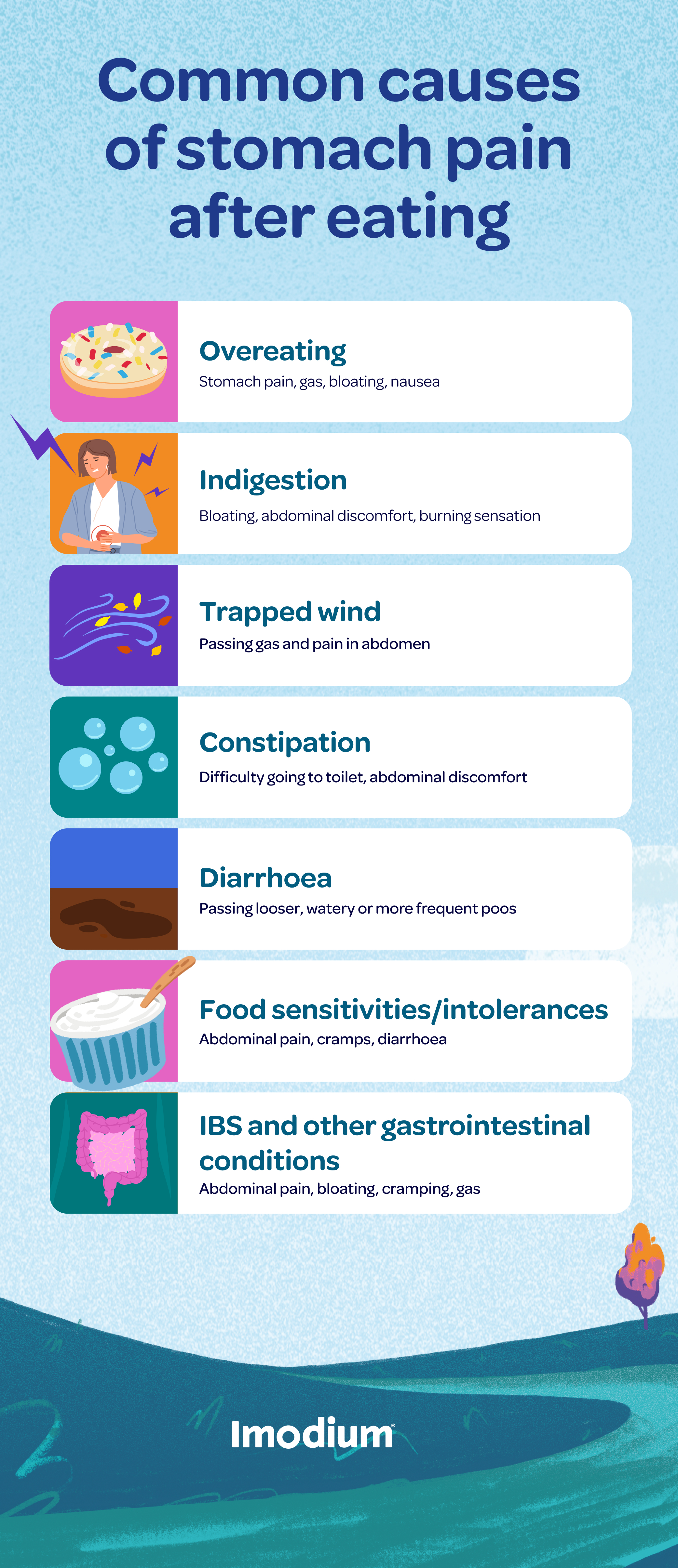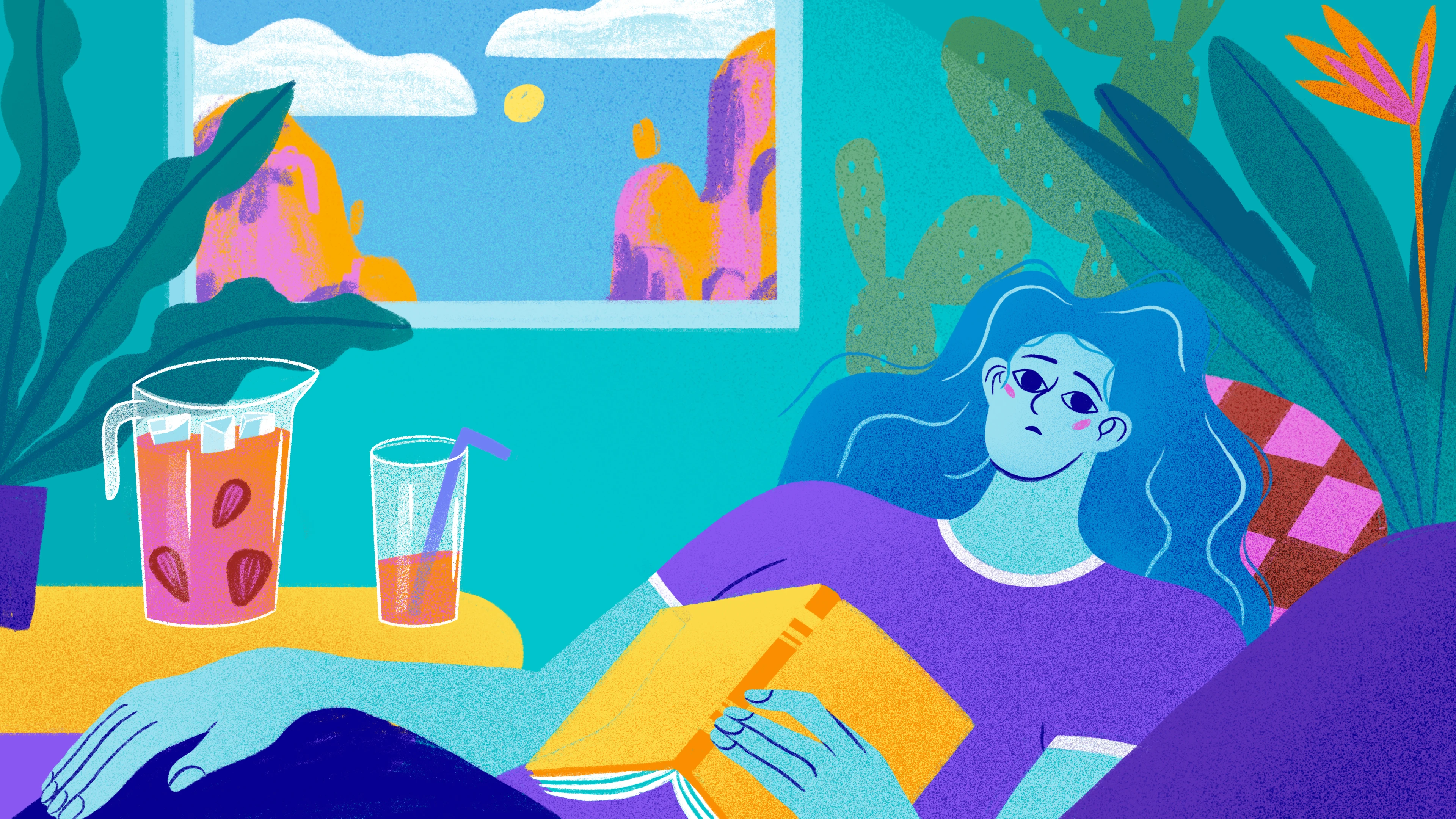Stomach pains are common, and you might experience stomach pain after eating from time to time. While most stomach aches are usually not a cause for concern, they can be quite uncomfortable. The pain can vary from a dull ache to a sharp twinge, and it could have accompanying symptoms such as bloating and nausea.
Read on to discover the main causes and symptoms of stomach pains after eating, and how you can find relief from an episode of diarrhoea and stomach pain with IMODIUM®.
What causes pain in the stomach after eating?
Stomach pain after eating can be caused by a number of reasons, such as:
Trapped wind
Trapped wind(flatulence) is a common, natural occurrence caused by gas in the intestines being passed out either by farting or burping. Some people naturally fart more than others. If you’re farting excessively or having smelly farts, it could be due to eating food that is harder to digest or it could be an indication of an underlying health issue.
Trapped wind can also cause:
A sharp pain or dull ache in your abdomen.
Bloating (a feeling of tightness or fullness).
Discomfort or pain in your chest, back, or sides.
Common foods that can cause trapped wind include beans, garlic, dairy products, wheat, and carbonated drinks.
Indigestion
Indigestion is discomfort or pain that comes after eating, while your stomach is still in the process of digesting. It can also make you feel full and bloated after a meal or drink.
With indigestion, you may experience burning pain behind the breastbone (heartburn), or pain or discomfort in your upper abdomen (dyspepsia). The two can occur at the same time or on their own, and typically happen not long after eating or drinking.
Indigestion is usually caused by acid from the stomach irritating the stomach lining or throat. This is known as acid reflux, and can be triggered or worsened by:
Eating certain foods and drinks, such as coffee, alcohol, spicy or fatty foods.
Stress and anxiety.
Being overweight.
Smoking.
Food poisoning (Stomach bug)
Food poisoning, or a stomach bug, is usually caused by eating something that’s been contaminated with germs. This can happen when food is:
Eaten after its expiry date.
Handled by someone with unclean hands.
Left out for too long.
Not stored correctly – for example, if it’s not chilled or frozen.
Not cooked or reheated thoroughly.
Common symptoms of food poisoning include stomach cramps , nausea, fever, and diarrhoea. These symptoms usually begin a few days after eating the food that led to the infection.
Overeating
Overeating is when you eat past the point of fullness. Overeating is common, and it can happen during times of celebration, as well as times of stress. When you’re stressed, your body releases cortisol, which can make you crave foods high in salt, fat, or sugar.
As well as experiencing stomach pain, you may also feel tired and sluggish, experience gas, bloating and nausea after overeating.
Irritable Bowel Syndrome
Irritable Bowel Syndrome (IBS) is a common condition that affects the digestive system. IBS can cause symptoms such as stomach cramps, constipation, diarrhoea, and bloating. It’s usually a lifelong problem. While there’s no known cure for IBS, medication and dietary changes can help you manage some of the symptoms.
Symptoms that can accompany stomach pain immediately after eating
There are many different symptoms that may accompany stomach pain after eating. Your symptoms might include:
An uncomfortable feeling of fullness
Heartburn
Acid reflux
Bloating
Cramping
Gas
Nausea
Vomiting
Regurgitation (when swallowing food comes back up)
Diarrhoea
If you experience a severe stabbing stomach pain after eating, or experience pain when touching your stomach or if you are vomiting blood, seek immediate medical attention.
How to avoid stomach pain after eating
While there isn’t a one-size-fits-all treatment to stop stomach pain after eating, there are some things you can try to provide relief. These include:
Make changes to your diet
Changing your eating and drinking habits can often provide relief against stomach pain and gas after eating. This may include avoiding carbonated drinks, and reducing the amount of dairy you consume.
Managing your portion sizes, eating regularly, and not rushing when eating – as well as avoiding foods that have caused discomfort in the past – can also help.
Stay hydrated
Drinking lots of water, both during mealtimes and between them, can help to potentially prevent stomach pain after eating.
Consider how you eat
You may be gulping too much air while drinking or chewing. Talking frequently while eating can also cause you to swallow more air. Other habits, such as sucking hard on sweets or chewing gum, can also contribute to this. Avoiding these habits can help reduce the amount of air you swallow, which can alleviate gas pain.
Reduce stress
You may experience stomach pain after eating during times of stress. This is because worry and anxiety can upset the delicate balance of digestion. Managing and reducing stress can help with your digestion, and potentially avoid any stomach pain and gas after eating.
Stop unhealthy habits
Unhealthy habits, such as binge drinking and smoking, can hurt your digestive system and can worsen digestive disorders. Avoiding these unhealthy habits may help prevent your stomach pain.
You can also use IMODIUM® Dual Action for relief if you have stomach pains with diarrhoea. The tablets work to relieve diarrhoea, while soothing painful stomach cramps and other symptoms that may arise, such as bloating and trapped wind.
When to see a doctor about stomach pain after eating
If you experience any of the following symptoms while having stomach pain after eating, contact your GP2:
Your bloating or stomach pain persists, or keeps coming back.
You have diarrhoea that does not subside after a few days.
Your stomach-ache worsens quickly and suddenly.
You bleed from your vagina or bottom, or you experience abnormal discharge from your vagina.
You pee less or more often, or peeing has become painful suddenly.
You’re losing weight without trying.
You experience problems swallowing food.
Stomach pain after eating FAQs
How long can stomach pain after eating last?
Stomach pain after eating is usually not serious and will typically go away after a few days. If you’re unsure what is causing your stomach pain and want advice on how to treat it, you can speak to your pharmacist.
Can food poisoning cause pain after eating?
Food poisoning can cause abdominal pain, which can be felt around the trunk of your body, including your back.

